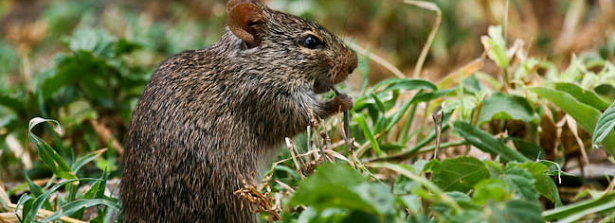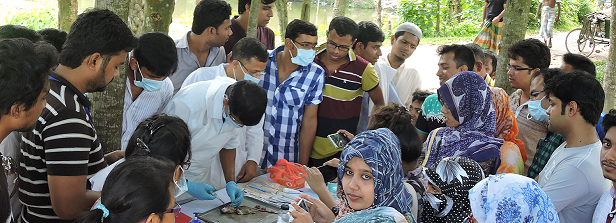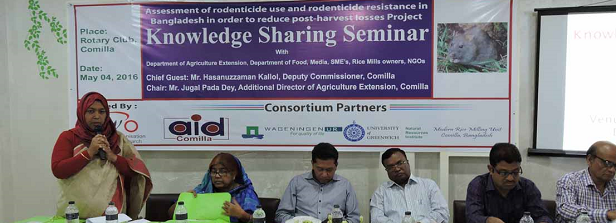Rodent management for post-harvest loss reduction in Bangladesh

Duration: October 2014 – October 2017. This project has been finalized.
Project information
Aim: To develop and improve strategies for prevention of post-harvest losses by rodents from farm to fork, with special attention to women and involvement of private sector partners to ensure sustainable practices are created. Generate information in terms of ecology of rodents and reliable calculations of post-harvest losses, possible interventions and new information on sociological aspects of rodent control.
Objective: To reduce spoilt food and environmental damage and improve food security in an extreme poor region.
Method: Obtain reliable data on rodent presence & monitoring of post-harvest losses in traditional farming systems. Improve effectiveness of countermeasures against rodents. Increase public knowledge about the impact of rodents. Put the project’s results into practice by directly involving a local SME.
Country: Bangladesh.
Dutch policy goals: Increase sustainable food production; and Improved access to nutrition.
Progress reports
Year 1: Rodent pests cause serious problems for subsistence farmers through loss, damage and contamination of food. Several studies recognized that rodents is a problem for stored rice. Farmer estimates of post-harvest loss ranged from 5 to 40% with an average of 13% (±0.02 sem). Despite these remarks on loss, few people went to much trouble to protect their stored rice from rodent attack. This research aims to improve food security, nutrition and health of Bangladesh families by understanding current rodent management practices and developing improved, sustainable technologies and strategies to reduce the impact of rodents on livelihoods.
Objectives
This project aims to help Bangladesh to develop strategies for the prevention of post-harvest losses by rodents. The main focus is ensuring that stakeholders throughout the food chain, policy makers and extension specialists are provided with appropriate tools and information to manage post-harvest losses caused by rodents using cost-effective, sustainable and ecologically-based strategies, thus leading to less contamination and loss of stored food. In this way, the project contributes directly to two of the ARF foci: increasing sustainable agricultural production, and ensuring equitable access to better nutrition.
Activities
a) Obtaining reliable data on rodent presence & monitoring of post-harvest losses in traditional farming systems
b) Improve effectiveness of countermeasures against rodents
c) Increase public knowledge about the impact of rodents
Year 2: To reduce post-harvest losses caused by rodents in Bangladesh, the research team first organized an inception meeting with researchers, government officials, business representatives, rodenticide producers and other stakeholders at Sher-e-Bangla Agriculture University in September 2015. The team members also conducted surveys on the problem in two villages among 674 farmers. They monitored the efficiency of a rodent trap at Modern Rice Milling Unit in Comilla and they assessed the grain store losses due to rodents in the same unit. Next, they analyzed rat urine and rat dropping in 24 locations across the country. In order to be sure that the information is used properly, they developed software for data entry and printed brochures and posters to help farmers reduce post-harvest losses.
Final report
Summary of the results: The project aimed to help Bangladesh to develop strategies for the prevention of post-harvest losses by rodents. The study resulted in insight in the amount of losses in both rice milling stations as well as losses of rice in villages. Furthermore, the rodent species causing the losses were identified, which helps to identify and develop management strategies. Participating farmers agreed that rodents were a problem for their stored rice. Farmer’s estimates of post harvest loss ranged from 5.00 to 40.00 percent with an average of 13.00 percent. Despite these remarks on loss, few people went through much trouble to protect their stored rice from rodent attack. Their perception is that rodent can chew through anything and gain access, no matter what they do to prevent it. Controlled store loss trials implemented indicated that real losses from rodent are between 10.00 to 20.00 percent of a farmers store. Contamination with urine and faeces was also severe (200 > 1,500 droppings per kg). Use of jute bags instead of other types (plastic bags) is in fact a step back in time as rats and mice will gnaw through the jute very easily and cause much more losses than with other types.


